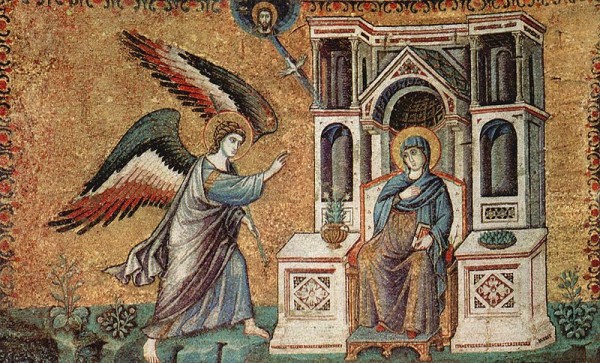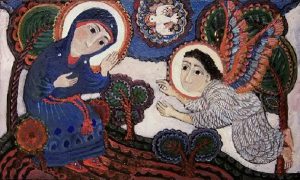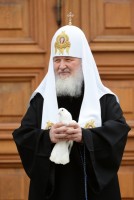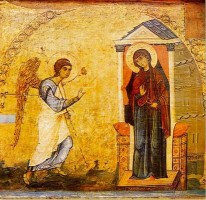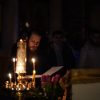The Annunciation! At one time this was one of the brightest and most joyful days of the year, the feast which consciously, and even unconsciously, was connected with a jubilant intuition, a radiant vision of the world and of life. The Gospel of St. Luke records the story of the Annunciation. (Please see Luke 1: 26-38).
Of course, viewed from the perspective of so-called “scientific” atheism this Gospel story supplies plenty of reasons for speaking of “myths and legends.” The rationalist will say, “When do angels ever appear to young women and hold conversations with them? Do believers really think that people of the twentieth century, living in a technological civilization, could believe this? Can’t believers see just how silly, unscientific and impossible this is?” The believer always has only one answer to this kind of contentious debate, disparagement and ridicule: yes, alas, it is impossible to fit this into your shallow worldview. As long as your arguments about God and religion remain on the superficial level of chemical experiments and mathematical formulas you will always easily win. But chemistry and mathematics are of no help whatsoever in proving or disproving anything at all in the realm of God and religion. In the language of your science, the words angel, glad tidings, joy and humility are of course completely meaningless. But why limit the discussion to religion? More than half of all words are incomprehensible to your rationalist language, and therefore in addition to religion you will have to suppress all poetry, literature, philosophy and virtually the whole of human imagination. You desire the entire world to think as you do, in terms of production and economic forces, of collectives and programs. Yet the world does not naturally think in this way and must be handcuffed and forced to do so, or rather, appear to do so. You say that all imagination is false because the “imaginary” does not exist, and yet the imagination is what people have always lived by, live by now, and will in the future as well. For everything most profound and most essential in life has always been expressed in the language of imagination. I don’t pretend to understand what an angel is, nor, using the limited language of rationalism, can I explain the event that occurred almost two thousand years ago in a tiny Galilean town. But it strikes me that mankind has never forgotten this story, that these few verses have repeatedly been incorporated into countless paintings, poems and prayers, and that they have inspired and continued to inspire. This means, of course, that people heard something infinitely important to them in these words, some truth which apparently could be expressed in no other way than in the childish, joyful language of Luke’s Gospel. What is this truth? What happened when the young woman, barely past childhood, suddenly heard — from what profound depth, from what transcendent height! — that wonderful greeting: ”Rejoice!” For that is indeed the angel’s message to Mary: Rejoice!
The world is filled with countless books on struggle and competition, each attempting to show that the road to happiness is hatred, and in none of them will you find the word “joy.” People don’t even know what the word means. But the very same joy announced by the angel remains a pulsating force, that still has power to startle and shake the human hearts. Go into a church on the eve of Annunciation. Stay, wait through the long service as it slowly unfolds. Then the moment comes when after the long wait, softly, with such divinely exquisite beauty the choir begins to sing the familiar festal hymn, “With the voice of the Archangel, we cry to You, O Pure One: Rejoice, O Full of Grace, the Lord is with You!” Hundreds and hundreds of years have gone by, and still, as we hear this invitation to rejoice, joy fills our heart in a wave of warmth. But what is this joy about? Above all we rejoice in the very presence of this woman herself, whose face, whose image, is known throughout the world, who gazes upon us from icons, and who became one of the most sublime and purest figures of art and human imagination. We rejoice in her response to the angel, to her faithfulness, purity, wholeness, to her total self-giving and boundless humility, all of which forever ring out in her words: ”Behold, I am the handmaid of the Lord; let it be to me according to your word.” Tell me, is anything in this world, in any of its rich and complex history, more sublime and more beautiful than this one human being? Mary, the Most Pure One, the One who is full of grace, is truly the One in whom, as the Church sings, “all Creation rejoices.” The Church answers the lie about man, the lie that reduces him to earth and appetite, to baseness and brutality, the lie that says he is permanently enslaved to the immutable and impersonal laws of nature, by pointing to the image of Mary, the most-pure Mother of God, the One to whom, in the words of a Russian poet, “the outpouring of sweetest human tears from overflowing hearts” is offered in unending stream. The lie continues to pervade the world, but we rejoice because here, in the image of Mary, the lie is shown for what it is. We rejoice with delight and wonder, for this image is always with us as comfort and encouragement, as inspiration and help. We rejoice because in gazing at this image, it is so easy to believe in the heavenly beauty of this world and in man’s heavenly, transcendent calling. The joy of Annunciation is about the angel’s glad tidings, that the people had found grace with God and that soon, very soon, through her, through this totally unknown Galilean woman, God would begin to fulfill the mystery of the world’s redemption. There would be no thunder and no fear in His presence, but He would come to her in the joy and fullness of childhood. Through her a Child will now be King: a Child, weak, defenseless, yet though Him all the powers of evil are to be forever stripped of power.
This is what we celebrate on the Annunciation and why the feast has always been, and remains, so joyful and radiant. But I repeat, none of this can be understood or expressed in the limited categories and language familiar to “scientific” atheism, which leads us to conclude that this approach willfully and arbitrarily has declared an entire dimension of human experience to be non-existent, unnecessary and dangerous, along with all the words and concepts used to express that experience. To debate this approach strictly on its own terms would be like first climbing down into a black underground pit where, because the sky can’t be seen, its existence is denied. The sun can’t be seen, and so there is no sun. All is dirty, repulsive, and dark, and so beauty is unknown and its existence denied. It is a place where joy is impossible, and so everyone is hostile and sad. But if you leave the pit and climb out, you suddenly find yourself in the midst of a resoundingly joyful church where once again you hear, “With the voice of the Archangel, we cry to You, O Pure One: Rejoice!”
(From, “Celebration of Faith: Volume 3, The Virgin Mary,” published by Saint Vladimir Seminary Press.)












